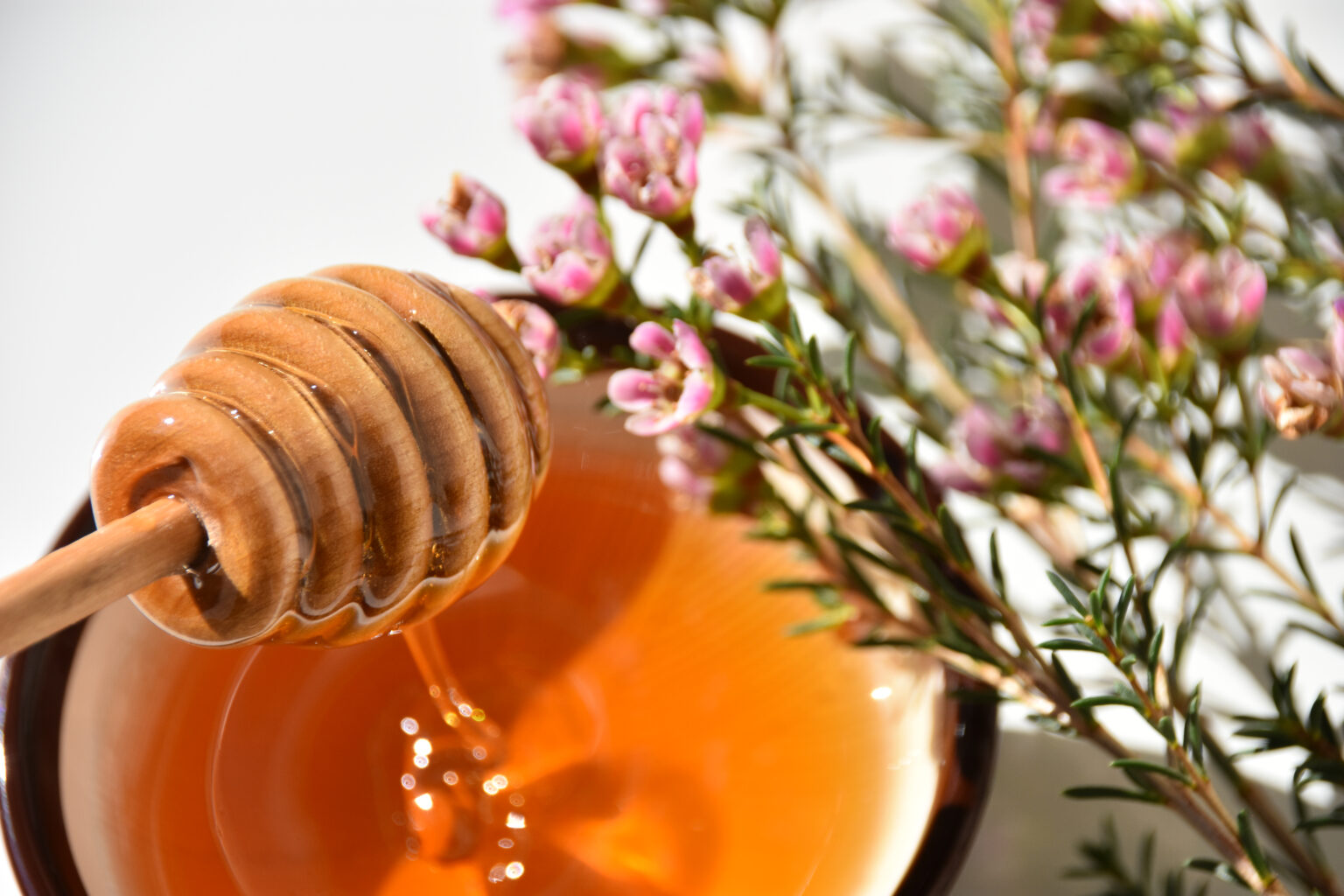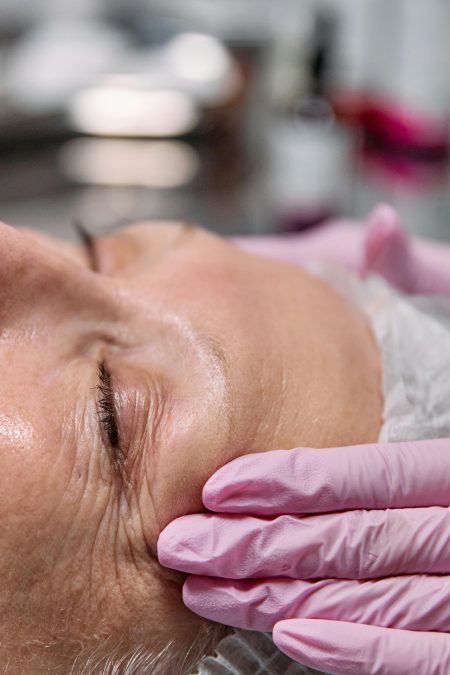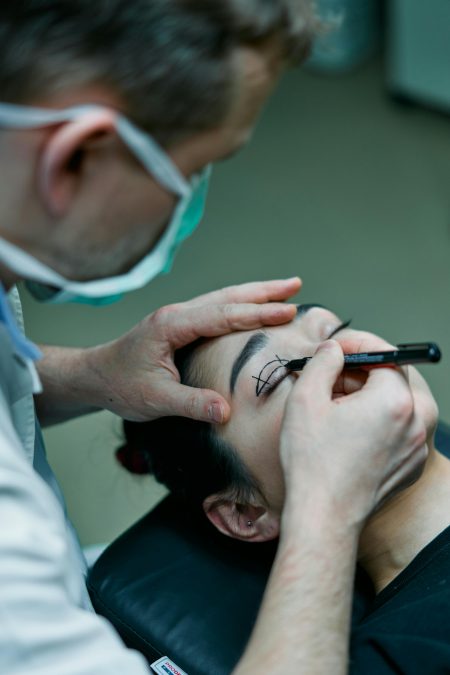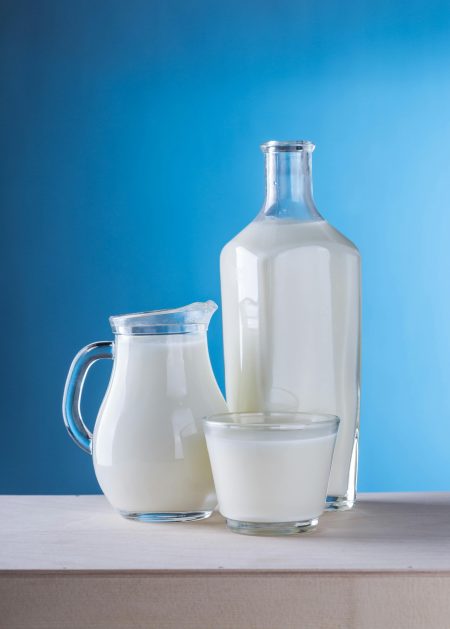If you’re a natural beauty enthusiast, you’ve likely heard of using honey as a topical ingredient for various treatments. Studies have shown that honey can help reduce inflammation, heal wounds, treat acne, and act as an emollient to seal in moisture. However, not all honey is created equal, and the best of the best is Mãnuka honey.
In recent years, Mãnuka honey has become quite popular, with farmers markets selling it and skincare brands claiming to use it in their formulas. But be wary of imitations – many brands dilute the Mãnuka so much that its potency is weakened, or they claim to have it on the label but only have “honey extract” listed in the ingredients. We’ll dive into everything you need to know about Mãnuka honey, from how it differs from regular honey to its clinically-measured benefits and how to find authentic Mãnuka.

What Is Mānuka Honey?
Mānuka honey is a rare and special type of honey produced by bees that collect nectar from the Mānuka tree, which is native to New Zealand. This honey has unique properties that make it highly sought after in the health and wellness industry.
One of the reasons why Mānuka honey is so special is due to the unique environment in which the Mānuka tree grows. New Zealand is a geothermal country with mineral-rich soils that have a high pH level. While many plants struggle to grow in this environment, the Mānuka tree thrives and becomes more potent as a result.
To produce Mānuka honey, beekeepers place their beehives in Mānuka bushes and allow their bees to forage on the Mānuka flowers. The honey produced in this way has distinct properties due to the environment and climate.
While Mānuka honey is now produced globally, the best and most authentic Mānuka honey comes from New Zealand. Just as authentic champagne can only come from the Champagne region of France, the same goes for Mānuka honey.
Mānuka honey has gained popularity due to its potential health benefits, including antibacterial and anti-inflammatory properties. It is also used in skincare products due to its moisturizing and healing properties. However, it is important to note that more research is needed to fully understand the potential benefits of Mānuka honey.
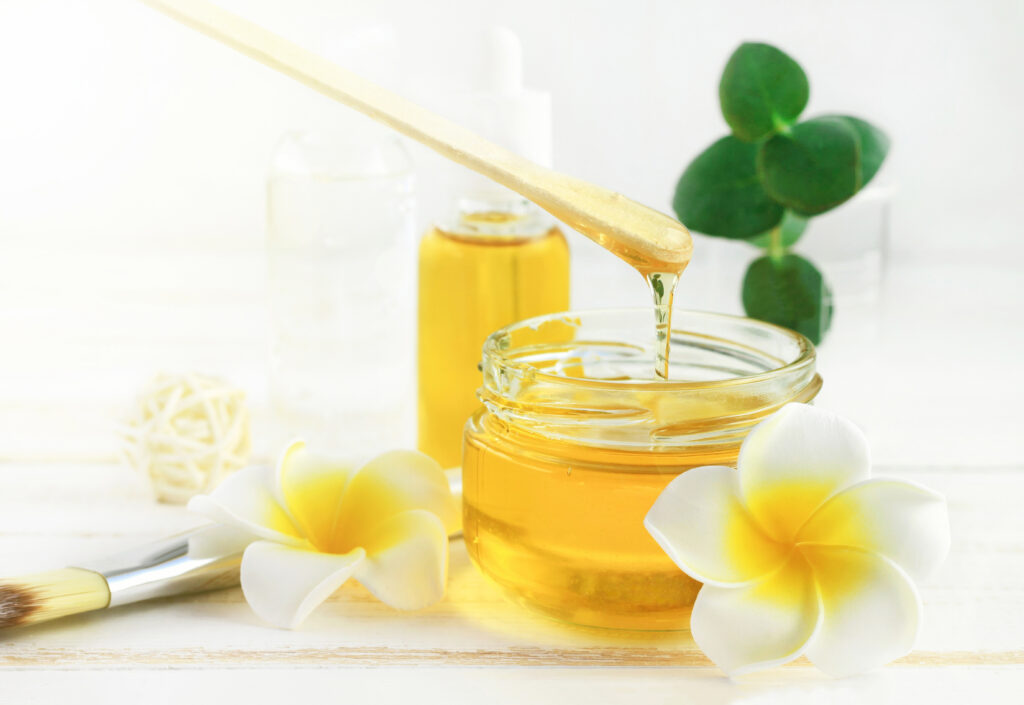
Mānuka Honey Benefits for Skin
Mānuka honey is a natural antimicrobial ingredient that has been scientifically recognized for its ability to accelerate wound healing. It contains proteins, vitamins, and has emollient and humectant properties that make it ideal for topical use in skincare. This honey has been used to calm inflammatory skin conditions like seborrheic dermatitis, psoriasis, and to repair skin wounds and fissures.
In addition to its wound-healing properties, Mānuka honey is also nourishing and moisturizing for the skin. It has humectant properties that draw moisture into the skin, making it a popular ingredient in lip treatments, masks, lotions, cleansers, and after-sun products. Mānuka honey is also rich in antioxidants that defend the skin against free radical damage and repair oxidative stress, providing anti-aging benefits.
Using Mānuka honey directly on the skin is effective, but it can also be formulated with complementary skincare ingredients such as vitamin C for added benefits. Incorporating Mānuka honey into your skincare routine can help to improve the overall health and appearance of your skin.
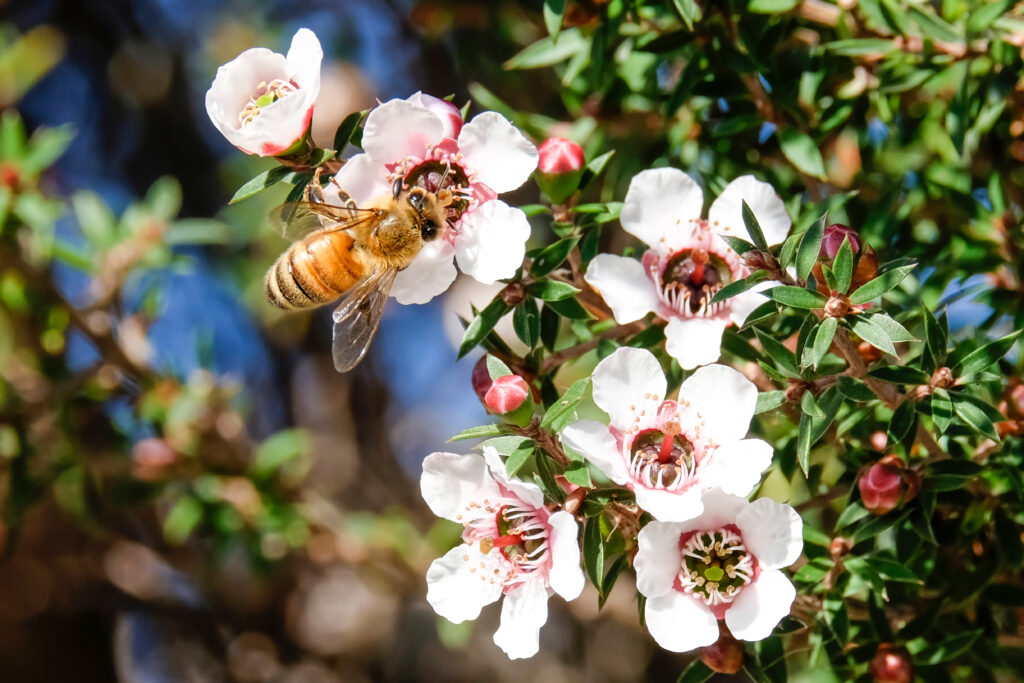
Difference Between Regular Honey vs. Mānuka Honey
When it comes to honey, Mānuka honey stands out from the rest due to its unique properties. Mānuka honey has a darker color compared to regular honey, and this is due to the presence of a compound called methylglyoxal (MGO), which makes it more potent in its antimicrobial abilities and antioxidant activity.
Mānuka honey has a low pH and higher osmolarity, making it more efficient at preventing the growth of pathogens. It is also more effective and less likely to lose efficacy over time because it is more light- and heat-stable. In contrast, regular honey could lose its benefits if heated to high temperatures.
Mānuka honey also contains enzymes, vitamins, and minerals, which are preserved through Mānuka Health’s maturation process. This is important because honey extract, which is used in regular honey, removes all moisture, beneficial enzymes, amino acids, and small amounts of bio-actives, among other things. By keeping the honey in its natural state, Mānuka Health ensures the potency and benefit of the Mānuka honey is realized in the formulations.
Mānuka honey is more potent in its antimicrobial abilities and antioxidant activity than regular honey due to the presence of MGO. It is also more efficient at preventing the growth of pathogens and less likely to lose its efficacy over time. Mānuka Health’s maturation process preserves the enzymes, vitamins, and minerals, making it a more beneficial option than regular honey.
| Regular Honey | Mānuka Honey |
|---|---|
| Lighter color | Darker color |
| No MGO | Contains MGO |
| Higher pH and lower osmolarity | Lower pH and higher osmolarity |
| Less light- and heat-stable | More light- and heat-stable |
| May lose efficacy over time | Less likely to lose efficacy over time |
| Heated to high temperatures, removing benefits | Preserved through maturation process |
| Honey extract removes beneficial enzymes, amino acids, and bio-actives | Whole honey preserves enzymes, amino acids, and bio-actives |
Who Will Best Benefit from Using Topical Mānuka Honey?
If you have sensitive or inflamed skin, or skin that has an impaired barrier, such as dry or irritated skin, you may benefit from using topical Mānuka honey. According to Dr. Nazarian, Mānuka honey can improve the skin’s barrier of hydration and stimulate repair pathways, which are vital for healthy skin.
Mānuka honey is also beneficial for acne-prone skin, according to Dr. Mraz and Robinson. They suggest avoiding pore-clogging oils and other triggering ingredients when using Mānuka honey. Additionally, Mānuka honey is gentler than other types of honey, making it ideal for those with sensitive skin.
Overall, if you have sensitive, inflamed, dry, or irritated skin, or acne-prone skin, using topical Mānuka honey may benefit you.
What to Look For in Skincare Products with Mānuka Honey
Mānuka honey is a popular ingredient in skincare products due to its unique antibacterial and anti-inflammatory properties. However, not all Mānuka honey is created equal, and it’s important to look for certain factors when choosing skincare products that contain this ingredient.
First and foremost, it’s essential to ensure that the Mānuka honey used in the product is genuine and of high quality. Look for the “Product of New Zealand” stamp, represented by the silver fern trademark symbol, and the UMF (Unique Mānuka Factor) label. These certifications ensure that the honey is authentic and has been independently tested for its unique antibacterial properties.
In addition to the quality of the honey, it’s also important to consider the other ingredients in the skincare product. Mānuka honey pairs well with hydrating ingredients like oils, butters, and glycerin, as well as peptides. Vitamin C and hyaluronic acid are also popular ingredients that work well with Mānuka honey.
However, it’s important to avoid mixing Mānuka honey with retinol or high levels of hydroxy acids, as these ingredients can be too harsh when combined with the emollient properties of Mānuka honey. Instead, consider using other bee-derived ingredients like propolis and royal jelly, which work well with Mānuka honey to renew the skin.
When choosing skincare products with Mānuka honey, it’s also a good idea to look for brands that are UMF-certified and use honey produced by beekeepers in New Zealand who are registered with the Official UMF Honey Association. Brands like Naturopathica and Mānuka Health are good options to consider, as they prioritize quality control and transparency in their production processes. Mānuka Health even includes scannable barcodes on its honey jars, allowing consumers to trace the honey back to its origins.
By being mindful of these factors, you can ensure that you’re choosing skincare products that contain high-quality Mānuka honey and complementary ingredients, helping to promote healthy, glowing skin.
How to Use Mānuka Honey Skincare
Mānuka honey skincare products can be easily incorporated into your daily routine. They are safe and gentle, making them suitable for most skin types. Here are some tips on how to use Mānuka honey skincare products effectively:
- Choose the right product for your skin needs: When shopping for Mānuka honey skincare products, look for the ones that cater to your specific skin concerns. Mānuka Health’s “Immortality Collection” is ideal for younger skin or skin that’s beginning to show slight signs of aging, while their “Pro Vitality” line is perfect for tackling dark spots. Naturopathica offers a range of products for cleansing, exfoliating, moisturizing, and misting.
- Check for certifications: Make sure that the Mānuka honey skincare product you choose has the correct certifications to ensure optimal benefits. Look for products that have the UMF (Unique Mānuka Factor) certification or the MGO (Methylglyoxal) certification.
- Use heavier balms and creams for the body: For areas of excess dryness like eczema patches or elbows, use heavier balms and creams. These products can soothe, nourish, and create an occlusive seal on the skin. Manuka Doctor offers a hand and foot cream that can help moisturize and soothe dry skin.
- Use lighter formulations for the face: For the face, use lighter formulations that are not mixed with comedogenic ingredients. Mānuka Health’s “Immortality Collection” offers a face cream, serum, lip treatment, and eye serum that can help hydrate, improve collagen, elasticity, and texture.
By following these tips, you can effectively incorporate Mānuka honey skincare products into your daily routine and enjoy their benefits. Remember to always patch test new products before using them on your entire face or body.


